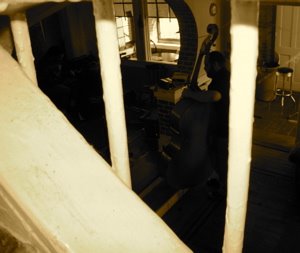
Yesterday morning I read Candide by Voltaire. Seemingly he was sparked to write the book in response to Leibniz's optimism. (It's been a long time since I read Leibniz, but I think his optimism comes from his belief in a perfect God, which could not make an imperfect world--or something like that.) So, where Leibniz sees the world as perfect as it can be, Voltaire shows the other extreme, focusing on a world bloated with murder, rape, and slavery. Voltaire, though, is funny. Leibniz is not. I'm not sure what it says about me that I find a book filled with murder and rape funny, but think Swift here. If he can make eating babies funny...
My concern while reading the book was that nothing would be offered but the opposite extreme of a perfect world. Voltaire offers us something else, but I don't want to spoil it for those who want to read the book. However, because extremes play an important part in the book, I began thinking of the Aristotelian mean and the Middle Way in Buddhism. At some point, I should research these ideas in order to compare and contrast them, but for now, I'm just working with my impressions coming away from Candide. I'm sure there's great scholarly work out there on these subjects, but I'll have to save that for another time.
Anyway, the mean is balance and balance is something that I'm striving for this summer. In music, I've heard the phrase "practice to your weaknesses." In other words, no matter how much fun it is to play Black Sabbath riffs over and over again, the only way to improve is to practice that Charlie Parker melody you keep forgetting. I've always had to spend more time practicing scales descending rather than ascending. But I'm jumping ahead of myself here...
Remember when I said that I read that whole book yesterday? Granted, it's not long, but I also read a few other things including a short piece by Nietzsche, "Seventy-Five Aphorisms from Five Volumes." Obviously reading is something I like to do, like that guitarist who likes to sit and play Black Sabbath. Achieving balance for me has to include time away from the books and the intellectual parts of my life. In order to practice to my weaknesses, I'm paying special attention to physical pursuits this summer.
In order to be serious about balance, I gave up Netflix and joined the YMCA. I meditate daily (and have been for a year-and-a-half, but recently I have been won over by Soto Zen--maybe I'll write about it at some point). With music, I'm seriously practicing towards my weaknesses; I discover new ones every day. Ear training, or just focused, conscious playing (including memorization), is very important for me now.
I had more to write about in terms of finding balance within my artistic life, particularly as it pertains to music, but I should save that for some other time. Stepping back and "playing to my weaknesses" wasn't the easiest thing to do, in fact, I had to discuss it with several people that are closest to me in case I had blinded myself to my own faults or problems. I guess it's common to say "Know thyself," but for now, I'll go with "We must cultivate our garden." I like the notion of cultivation (process) and how the garden is owned by many, which for me ties the one to the many, the personal to the public or professional. For a teacher, it makes sense to view this cultivation from many angles, including how balance, or the striving for it, will hopefully benefit all those roles I play.

No comments:
Post a Comment